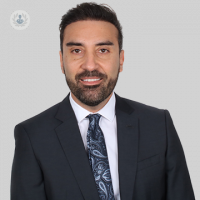I have been diagnosed with angina. Am I going to have a heart attack?
Written by:Any chest pain can be a cause of concern. There are many reasons why discomfort in the chest can occur, so it is important that the cause is diagnosed to ensure it is nothing serious. In this article, expert Cambridge-based consultant cardiologist, Dr Pierluigi Costanzo shares his expertise on angina; a condition that results in chest pain and discomfort. He explains what an angina attack feels like and when medical attention is required.

What is angina?
Angina is a type of chest pain that occurs when your heart muscle does not get enough blood. Doctors typically refer to this as “stable” angina, because it is a predictable pattern of chest discomfort or pain. In most cases, the pain starts and radiates from the chest. It can be felt in just the chest, or also the left (or occasionally the right) arm, the jaw, or the back. The level of discomfort might vary; some might feel real pain, some a discomfort, or pressure or a burning feeling.
What does an angina attack feel like?
Angina is characterised by a pattern of discomfort. It usually starts gradually during intense, physical exertion. This pattern of pain is different from the one I have written about in my article, “Do I need to worry about a stabbing pain in my chest?”. If you are a very fit person, the chest discomfort would start when you are exercising at your most intense. For example, if you are a runner, you would notice chest tightness when running uphill or when trying to run faster than usual. If you are a cyclist, similarly the chest discomfort would start when cycling uphill. If you are not particularly fit, you would probably notice chest discomfort when climbing stairs. Angina pain will be triggered during your most demanding activity. As soon as you rest or perform a less demanding activity, the discomfort will settle. Usually, it would take no more than ten or fifteen minutes for the discomfort to completely disappear.
When we exercise at a higher intensity, our heart pumps blood with a stronger force and tends to speed up. As a consequence, the heart, like any muscle, will demand more oxygen and hence more blood. Therefore, if one or more of the three main heart arteries (coronaries) are clogged with cholesterol build-up, you will start feeling angina, as described above. The tighter the narrowing is or if more than one artery is narrowed, the more likely the pain or discomfort is to occur without strenuous exercise.
Interestingly, cold temperatures can affect angina, and in these circumstances is more likely to be brought on by a lighter level of exertion. The cold causes an increase in blood pressure, mainly driven by constrictions of the blood vessels of the body in lower temperatures. As a result, the heart muscle needs more oxygen because it is pumping harder against the increased resistance produced by our body.
Does angina require immediate medical attention?
If you feel that you are experiencing these symptoms, do not panic! Stable angina is not a heart attack. However, it needs medical attention to clarify whether there are coronary artery restrictions and, if so, where they are located.
One of the first things that your primary care doctor or your cardiologist will do is to give you any anti-angina medication, either as a spray for under the tongue or as a tablet. Further tests will also be arranged.
How long can you wait before seeking medical attention?
If the discomfort is only felt during intense exercise, as described above, you can arrange an appointment with a primary care doctor or a cardiologist. However, if the discomfort comes on during light exercise, when at rest, or persists (even after fifteen minutes or after taking the nitroglycerin (GTN) spray or tablet prescribed) that is when you have to seek urgent medical help and call 999.
This is when the chest discomfort is more than just stable angina and might instead represent a heart attack. Essentially, the heart arteries’ cholesterol build-up might have ruptured and caused debris and micro-clots to clog up the heart circulation. In more severe cases, the plaque might have ruptured and suddenly blocked the artery causing a total flow obstruction.
Dr Peirluigi Costanzo is one of the UK’s leading consultant cardiologists. If you suspect you may be suffering from the symptoms of angina and would like to organise a consultation with Dr Costanzo, you can do so by visiting his Top Doctors profile.


